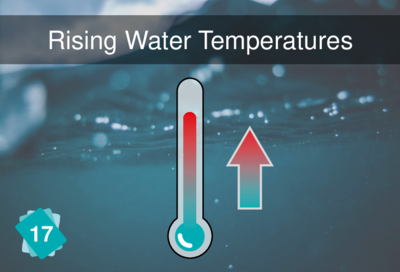En-en adult card 17 increase in water temperature: Difference between revisions
No edit summary |
m (Minor corrections) |
||
| Line 4: | Line 4: | ||
|title=Increase in Water Temperature | |title=Increase in Water Temperature | ||
}} | }} | ||
== Explanation== | |||
The ocean is warming by only about a tenth of a degree at the surface and even less under water. Why so little when it absorbs 93% of the excess energy on Earth? This is because it is much larger than the atmosphere and it has a much greater calorific capacity. | |||
To measure this, you need to remember that the ocean covers 71% of the Earth's surface and that it has a depth of 4000 m on average. The atmosphere extends over a greater height, but if brought it back to the same density as water, it would only be 10 m thick. (That's why we gain one atmosphere of pressure every 10 m when we dive.) | |||
The water expands very little. How can warming the ocean by a tenth of a degree result in a rise in the water level? A first answer is that the ocean is 4000 m deep on average, so a very small expansion is enough to amount to a few centimetres. | |||
== Correction== | == Correction== | ||
| Line 14: | Line 21: | ||
* [[En-en_adult_card_34_cyclones|Cyclones]] | * [[En-en_adult_card_34_cyclones|Cyclones]] | ||
* [[En-en_adult_card_42_methane_hydrates|Methane Hydrates]] | * [[En-en_adult_card_42_methane_hydrates|Methane Hydrates]] | ||
[[fr:Fr-fr_adulte_carte_17_hausse_température_eau]] | [[fr:Fr-fr_adulte_carte_17_hausse_température_eau]] | ||
Revision as of 16:28, 5 April 2021
Card #17: Increase in Water Temperature
| Causes | Consequences | |

|
Oceans absorb 93% of the energy accumulated on Earth.
Their temperature has therefore increased, especially in the upper layers.
The water expands as it warms up.
Explanation
The ocean is warming by only about a tenth of a degree at the surface and even less under water. Why so little when it absorbs 93% of the excess energy on Earth? This is because it is much larger than the atmosphere and it has a much greater calorific capacity.
To measure this, you need to remember that the ocean covers 71% of the Earth's surface and that it has a depth of 4000 m on average. The atmosphere extends over a greater height, but if brought it back to the same density as water, it would only be 10 m thick. (That's why we gain one atmosphere of pressure every 10 m when we dive.)
The water expands very little. How can warming the ocean by a tenth of a degree result in a rise in the water level? A first answer is that the ocean is 4000 m deep on average, so a very small expansion is enough to amount to a few centimetres.